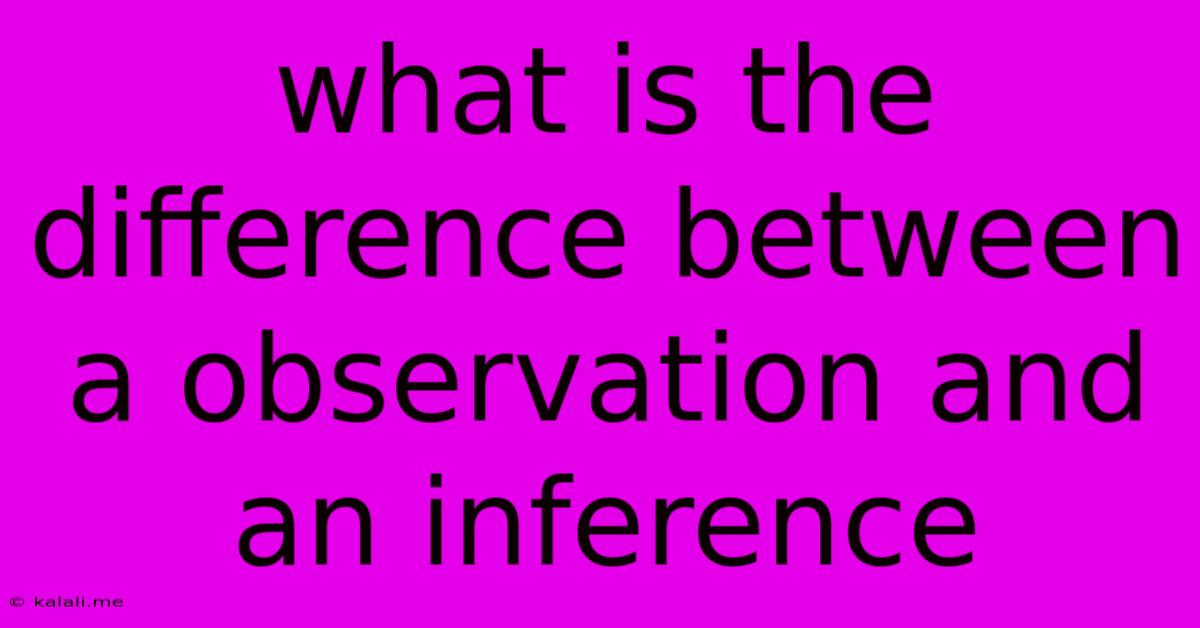What Is The Difference Between A Observation And An Inference
Kalali
Jun 13, 2025 · 3 min read

Table of Contents
Observation vs. Inference: Understanding the Crucial Difference in Scientific Thinking
This article delves into the fundamental difference between observation and inference, two crucial aspects of scientific thinking and critical analysis. Understanding this distinction is key to developing strong reasoning skills and avoiding misleading conclusions. We'll explore clear examples to illustrate the contrast and help you confidently differentiate between these concepts in various contexts.
Observations are the foundation of scientific inquiry. They are the direct results of using your senses to gather information about the world around you. Inferences, on the other hand, are interpretations or conclusions based on those observations. The line between them can sometimes be subtle, but recognizing the difference is essential for accurate data analysis and drawing valid conclusions.
What is an Observation?
An observation is a factual statement based on what you perceive through your senses – sight, hearing, smell, taste, and touch. It's a description of something you've directly witnessed. Good observations are:
- Objective: They are free from personal opinions or biases. Focus on the facts, not interpretations.
- Specific: They provide detailed information about what was seen, heard, smelled, tasted, or felt. Avoid vague language.
- Measurable (where applicable): If possible, quantify your observations. For example, instead of "The plant is tall," say "The plant is 1.5 meters tall."
- Repeatable: Another person should be able to make similar observations under the same conditions.
Examples of Observations:
- "The sky is blue."
- "The cat is sitting on the mat."
- "The water is boiling at 100°C."
- "The metal feels cold to the touch."
What is an Inference?
An inference is a logical interpretation or conclusion based on your observations and prior knowledge. It's a judgment or explanation you make based on evidence, but it's not directly observable. Inferences are educated guesses, but they aren't guaranteed to be accurate. The reliability of an inference depends on the quality of the observations and the background knowledge used to interpret them.
Examples of Inferences:
- Observation: "The ground is wet." Inference: "It must have rained." (This inference is likely, but it could also be due to watering, a leak, or dew.)
- Observation: "The leaves on the tree are changing color." Inference: "It must be autumn." (This is a reasonable inference, but other factors could cause leaf color change.)
- Observation: "The dog is barking aggressively." Inference: "The dog is feeling threatened or protective." (This inference requires understanding dog behavior, which is not purely observational.)
Key Differences Summarized:
| Feature | Observation | Inference |
|---|---|---|
| Nature | Factual statement based on senses | Logical interpretation based on observations |
| Basis | Direct perception | Prior knowledge and interpretation |
| Objectivity | Objective (ideally) | Subjective (potentially) |
| Certainty | Certain (if accurate observation) | Uncertain (can be correct or incorrect) |
| Verification | Directly verifiable | Indirectly verifiable (requires further investigation) |
Improving Your Observational and Inferential Skills:
Developing strong observational and inferential skills is a process. Practice these techniques to hone your abilities:
- Pay close attention to detail: Train yourself to observe meticulously, noting both large and small features.
- Ask clarifying questions: Don't jump to conclusions. Gather more information before making inferences.
- Consider alternative explanations: Always evaluate multiple possibilities when making inferences.
- Test your inferences: Whenever possible, design experiments or gather additional data to confirm or refute your inferences.
By understanding the crucial difference between observation and inference, you can improve your critical thinking, scientific reasoning, and problem-solving skills. Remember to base your conclusions on solid evidence and be mindful of the limitations of inferences.
Latest Posts
Latest Posts
-
Which Of The Following Is Not Considered Appropriate Email Etiquette
Jun 14, 2025
-
Which Of The Following Is Not A Major Mineral
Jun 14, 2025
-
Whats The Square Root Of 149
Jun 14, 2025
-
What Are The Factors For 62
Jun 14, 2025
-
Si Unit For Density Of Water
Jun 14, 2025
Related Post
Thank you for visiting our website which covers about What Is The Difference Between A Observation And An Inference . We hope the information provided has been useful to you. Feel free to contact us if you have any questions or need further assistance. See you next time and don't miss to bookmark.